2018学年新人教版pep六年级英语下册知识点复习整理
新人教版(PEP)小学英语六年级下册各单元知识点总结
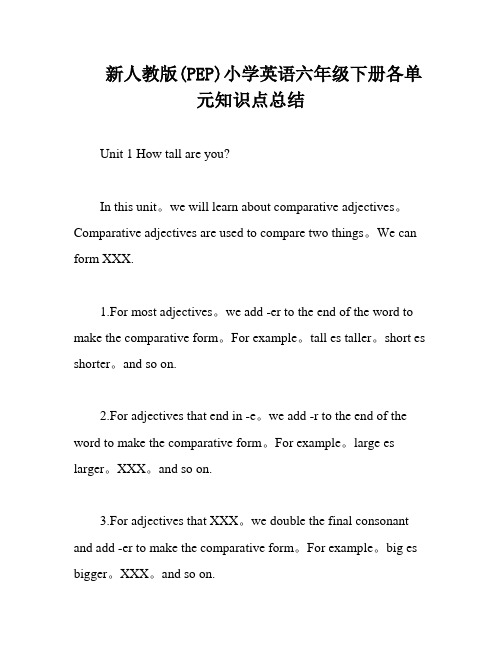
新人教版(PEP)小学英语六年级下册各单元知识点总结Unit 1 How tall are you?In this unit。
we will learn about comparative adjectives。
Comparative adjectives are used to compare two things。
We can form XXX.1.For most adjectives。
we add -er to the end of the word to make the comparative form。
For example。
tall es taller。
short es shorter。
and so on.2.For adjectives that end in -e。
we add -r to the end of the word to make the comparative form。
For example。
large es larger。
XXX。
and so on.3.For adjectives that XXX。
we double the final consonant and add -er to make the comparative form。
For example。
big es bigger。
XXX。
and so on.4.For adjectives that end in -y。
we change the -y to -i andadd -er to make the comparative form。
For example。
happy es happier。
heavy es heavier。
and so on.XXX adjectives。
we will also learn some new vocabulary words。
such as dinosaur。
2017-2018学年pep人教版六年级英语下册全册知识点归纳
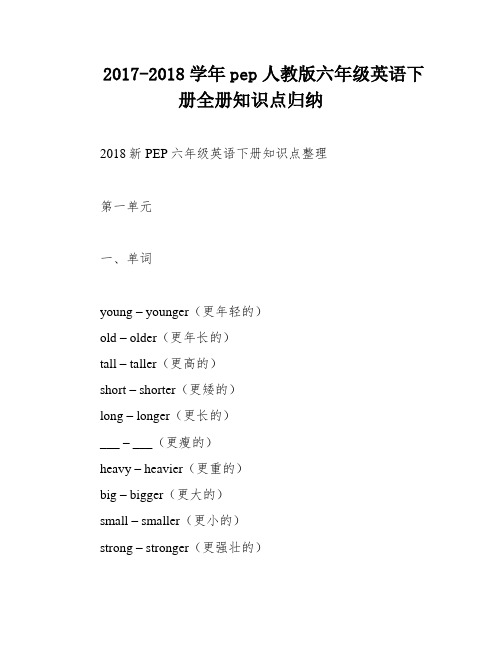
2017-2018学年pep人教版六年级英语下册全册知识点归纳2018新PEP六年级英语下册知识点整理第一单元一、单词young – younger(更年轻的)old – older(更年长的)tall – taller(更高的)short – shorter(更矮的)long – longer(更长的)___ – ___(更瘦的)heavy – heavier(更重的)big – bigger(更大的)small – smaller(更小的)strong – stronger(更强壮的)二、句子1.That is the ___.2.You are older than me.3.How tall are you。
I am 1.65 meters.4.What size are your shoes?5.My shoes are size 37.6.Your ___.7.How heavy are you。
8.I weigh 48 kilograms.三、语法复要点形容词的比较级1.形容词比较级在句子中的运用:两个事物或人的比较用比较级,比较级后面一般带有单词than。
than后的人称代词用主格(口语中可用宾格)。
2.形容词加er的规则:⑴一般在词尾加er;⑵以字母e结尾,加r;如:nice – nicer⑶以一个元音字母和一个辅音字母结尾,应双写末尾的辅音字母,再加er;如:big – bigger。
thin – ___⑷以“辅音字母+y”结尾,先把y变i,再加er;如:heavy – heavier3.不规则形容词比较级:good/well – better例句:1.It is taller than both of us together.2.Your ___.3.I am heavier than you.第二单元一、单词clean(打扫)– cleaned(clean的过去式)stay(停留)– stayed(stay的过去式)___ the room were the things I did last weekend。
人教PEP版英语六年级(下册)课本全册单元知识汇总
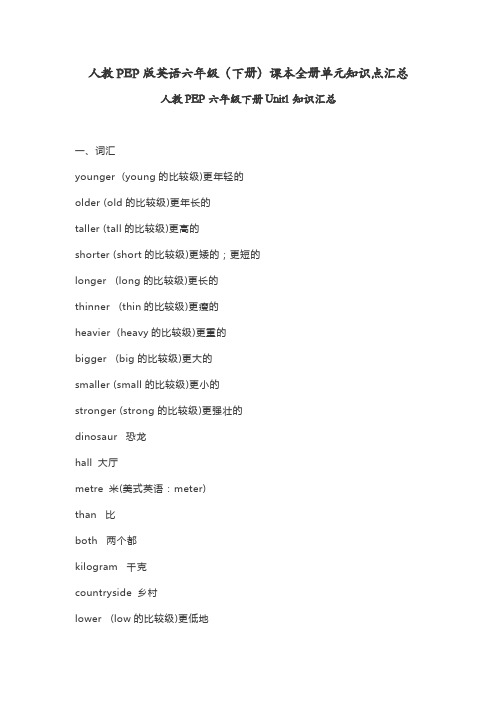
人教PEP版英语六年级(下册)课本全册单元知识点汇总人教PEP六年级下册Unit1知识汇总一、词汇younger (young的比较级)更年轻的older (old的比较级)更年长的taller (tall的比较级)更高的shorter (short的比较级)更矮的;更短的longer (long的比较级)更长的thinner (thin的比较级)更瘦的heavier (heavy的比较级)更重的bigger (big的比较级)更大的smaller (small的比较级)更小的stronger (strong的比较级)更强壮的dinosaur 恐龙hall 大厅metre 米(美式英语:meter)than 比both 两个都kilogram 千克countryside 乡村lower (low的比较级)更低地shadow 阴影;影子smarter (smart的比较级)更聪明的become 开始变得;变成二、句子1. I’m taller than this dinosaur. 我比这只恐龙高。
2. Some dinosaurs are bigger than houses. Some are smaller than our schoolbags. 一些恐龙比房子大。
一些比我们的书包小。
3. -- How heavy is it? 它体重多少?-- It’s five tons. 它5吨。
4. -- What size are your shoes? 你穿多大号的鞋?-- My shoes are size 35. 我穿35号的鞋。
5. -- How tall is it? 它有多高?-- Maybe 4 metres. 可能4米。
6. It is taller than both of us together. 它比我们俩加起来还高。
7. There are more dinosaurs over there. 那边有更多恐龙。
人教版pep六年级下册知识点

人教版pep六年级下册知识点PEP(Primary English Program)是指小学英语教学计划,人教版是指由人民教育出版社(People's Education Press)出版的版本。
下面是人教版PEP六年级下册的英语知识点总结:Unit 1: Seasons and Weather(季节和天气)- 学生将学会用英语表达不同季节和天气的词汇,例如:spring (春天)、summer(夏天)、autumn(秋天)、winter(冬天)等。
- 学生将学会描述天气状况,例如:It's sunny(阳光明媚)、It's rainy(下雨了)等。
Unit 2: Healthy Eating(健康饮食)- 学生将学会用英语表达一些食物的名称,例如:fruits(水果)、vegetables(蔬菜)、meat(肉类)等。
- 学生将学会表达自己的饮食偏好,例如:I like apples(我喜欢苹果)等。
Unit 3: Daily Routines(日常生活)- 学生将学会用英语表达一天中的不同活动,例如:get up(起床)、have breakfast(吃早餐)、go to school(去学校)等。
- 学生将学会描述自己和他人的日常活动,例如:She brushes her teeth(她刷牙)等。
Unit 4: Hobbies(爱好)- 学生将学会用英语表达各种爱好,例如:swimming(游泳)、drawing(画画)、singing(唱歌)等。
- 学生将学会描述自己和他人的兴趣爱好,例如:I like playing football(我喜欢踢足球)等。
Unit 5: At the Farm(在农场)- 学生将学会用英语表达与农场相关的词汇,例如:cow(奶牛)、pig(猪)、chicken(鸡)等。
- 学生将学会描述农场中的动物和活动,例如:I feed the chickens(我喂鸡)等。
pep六年级下册知识点归纳总结

pep六年级下册知识点归纳总结PEP(人教版小学英语)六年级下册是小学英语学习的最后一个学期,知识点相对较多,需要系统性的总结和归纳。
本文旨在对PEP六年级下册的知识点进行归纳总结,以帮助学生复习和掌握这些重要的知识内容。
一、单词和词组1. 数字:数数词、序数词(1-100)例:one, two, three, four, five, six, seven, eight, nine, ten, eleven, twelve, thirteen, fourteen, fifteen, sixteen, seventeen, eighteen, nineteen, twenty, thirty, forty, fifty, sixty, seventy, eighty, ninety, one hundred;first, second, third, fourth, fifth, sixth, seventh, eighth, ninth, tenth2. 时间词:days of the week, months of the year例:Monday, Tuesday, Wednesday, Thursday, Friday, Saturday, Sunday;January, February, March, April, May, June, July, August, September, October, November, December3. 季节和天气:seasons and weather例:spring, summer, autumn, winter;sunny, cloudy, rainy, windy, snowy4. 学科词汇:subject words例:Chinese, English, math, science, art, music, P.E.5. 学校用品:school supplies例:desk, chair, book, pencil, pen, ruler, eraser, backpack6. 动作动词:action verbs例:run, walk, jump, skip, swim, dance, sing, read, write, draw, paint7. 食物:food例:apple, banana, orange, cake, bread, milk, juice, water, rice, noodles8. 喜好:likes and dislikes例:like, love, enjoy, dislike, hate, don't mind9. 家庭成员:family members例:father, mother, brother, sister, grandfather, grandmother10. 动物:animals例:dog, cat, bird, fish, rabbit, panda, tiger, elephant, giraffe二、句型和语法1. 英文问句的基本结构:疑问词 + 助动词 / be动词 / 助动词 + 主语+ 动词 + 其他?例:What is your name? Are you a student? Can you speak English?2. 一般现在时:主语 + 动词原形(第三人称单数要加-s)例:I like ice cream. She likes dancing.3. 一般过去时:主语 + 动词过去式例:I watched a movie yesterday. He played soccer last weekend.4. 现在进行时:主语 + am/is/are + 动词-ing例:I am reading a book. They are playing basketball.5. 情态动词can表示能力、许可:主语 + can + 动词原形例:I can swim. Can I go to the restroom?6. 情态动词should表示建议、应该:主语 + should + 动词原形例:You should brush your teeth every morning.7. 物主代词:my, your, his, her, its, our, their例:This is my pencil. That is your book.8. 形容词比较级:原级 + -er / more + 形容词 + than例:He is taller than me. She is more beautiful than her sister.9. 数量词:a few, a little, many, much例:I have a few friends. We have a little time.10. 不可数名词和可数名词的用法例:I have some water. I have two apples.三、阅读理解技巧1. 阅读短文时要注意关键词和上下文的联系,提高阅读理解能力。
人教pep版六年级下册英语知识点归纳

人教pep版六年级下册英语知识点归纳
人教PEP版六年级下册英语的知识点主要包括以下内容:
1. 语音知识:掌握元音字母的读音,如/i:/、/i/等。
了解单词的重读音节,如syllables(音节)等。
2. 词汇:掌握并积累常用的词汇,如动物、食物、职业、描述性词汇等。
3. 语法:掌握一般过去时的构成和用法,如动词的过去式形式变化规则,如clean-cleaned等。
学习比较级的构成和用法,如adj. + er(或more + adj.)等。
了解情态动词can和must的用法。
4. 句型:掌握表示过去的一般疑问句和肯定回答、否定回答的句型结构,如Did you...? Yes, I did. / No, I didn't.等。
5. 阅读理解:能够理解并从短文中获取信息,如人物的姓名、年龄、爱好等。
掌握阅读理解常见的问题类型,如选择题、判断题等。
6. 书写能力:能够准确地书写所学的单词和句子,培养正确的书写习惯。
以上是人教PEP版六年级下册英语的主要知识点归纳,希望对你有帮助。
pep小学英语六年级下册知识点总结

pep小学英语六年级下册知识点总结PEP小学英语六年级下册是小学英语学习的重要阶段,它不仅涵盖了丰富的词汇量,还包含了各种语法点和句型结构,为学生进入初中英语学习打下坚实的基础。
以下是对PEP小学英语六年级下册知识点的总结:一、词汇学习1. 学习与日常生活密切相关的词汇,如家庭成员、日常活动、学校科目等。
2. 掌握一些描述性词汇,如颜色、大小、形状等。
3. 学习一些动词的过去式,如went, saw, did等,以描述过去发生的事情。
二、语法知识1. 一般过去时:掌握描述过去发生的事情的时态,如went to the park yesterday。
2. 现在完成时:了解表示过去发生的动作对现在造成的影响或结果,如I have finished my homework。
3. 形容词比较级和最高级:学会使用比较级和最高级形容词来表达事物的比较和最高级,如This book is more interesting than that one。
三、句型结构1. 询问和回答日常活动:What did you do last weekend? I went to the zoo.2. 描述过去的经历:I visited my grandparents last summer.3. 表达喜好和不喜欢:I like playing basketball, but I don't like swimming.四、听力技巧1. 学会从对话或短文中提取关键信息。
2. 理解并回答有关时间、地点、人物和事件的问题。
五、口语表达1. 能够就日常生活话题进行简单对话。
2. 能够用英语描述自己的经历和感受。
六、阅读能力1. 阅读并理解简单的英语故事、短文和图表。
2. 学会从阅读材料中获取信息,并回答相关问题。
七、写作技巧1. 能够写简单的英语日记或信件。
2. 学会使用正确的时态和句型结构来表达自己的观点。
八、文化意识1. 了解一些英语国家的文化习俗和节日。
新人教版(PEP)小学英语六年级下册各单元知识点总结复习资料
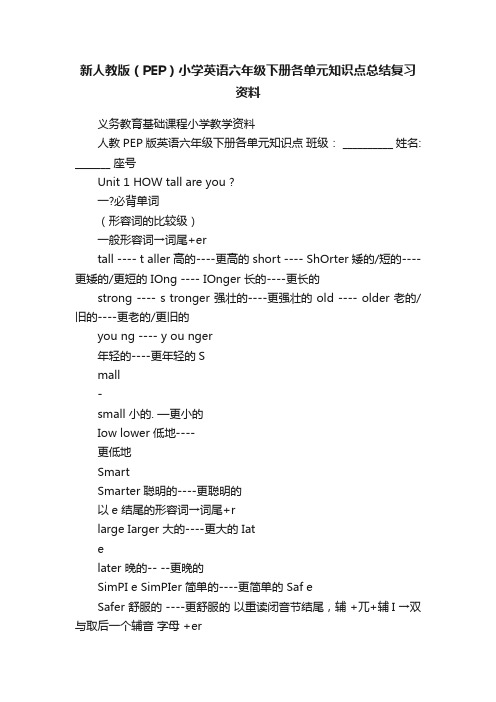
新人教版(PEP)小学英语六年级下册各单元知识点总结复习资料义务教育基础课程小学教学资料人教PEP 版英语六年级下册各单元知识点班级: __________ 姓名: _______ 座号Unit 1 HOW tall are you ?一?必背单词(形容词的比较级)一般形容词→词尾+ertall ---- t aller 高的----更高的 short ---- ShOrter 矮的/短的----更矮的/更短的 IOng ---- IOnger 长的----更长的strong ---- s tronger 强壮的----更强壮的 old ---- older 老的/旧的----更老的/更旧的you ng ---- y ou nger年轻的----更年轻的Small-small 小的. —更小的Iow lower 低地----更低地SmartSmarter 聪明的----更聪明的以e 结尾的形容词→词尾+rlarge Iarger 大的----更大的 Iatelater 晚的-- --更晚的SimPI e SimPIer 简单的----更简单的 Saf eSafer 舒服的 ----更舒服的以重读闭音节结尾,辅 +兀+辅I →双与取后一个辅音字母 +erbig - bigger 大的—更大的 thin thi nner 瘦的更瘦的 fat fatter 胖的更胖的 SadSadder 难过的-更难过的 hot -hotter 热的-更热的Wet -Wetter 潮湿的-更潮湿的dinoSaUr 恐龙hall 大厅than 比both 两个都meter 米kilogram 千克;公斤 SiZe 号码 feet 脚 Wear 穿 countryside 乡村ShadOW 影子;阴影 become 变成;开始变得二. 重点句型⑴问年龄,身高,体重等 How old are you?How tall are you?How heavy are you?---I ' m ________ (years old). --- I ' m _______ m etres tall. ---- I ' m _______ kilograms ⑵问物品的情况:① How large is your room? 你的房间有多大? It ' S _____ m (SqUare meters.) 有 __ 方米。
六年级下册英语pep版知识总结

六年级下册英语PEP版的知识总结,可以从以下几个方面进行概括:
一、语法知识
1.将来时态:通过学习一般将来时态,学生可以表达未来的计划、
打算和愿望。
2.情态动词:学生将学习can、may、must等情态动词的用法,以及
它们在句子中的运用。
3.形容词的比较级和最高级:学生将学习形容词的比较级和最高级
的构成方法,以及它们在句子中的运用。
4.祈使句:学生将学习如何使用祈使句来表达请求、命令或建议。
二、词汇积累
1.千、百、十、一:学生将学习一千、一百、十和一等数字的表达
方式。
2.职业:学生将学习各种职业的名称和相关的词汇。
3.月份和日期:学生将学习如何表达日期和月份,以及相关的节日
和活动。
4.描述外貌和性格:学生将学习如何用英语描述人的外貌和性格特
征。
三、日常交际用语
1.问候和介绍:学生将学习如何用英语问候和介绍自己和他人。
2.请求和建议:学生将学习如何用英语提出请求和建议。
3.时间和日期:学生将学习如何用英语询问和表达时间。
人教pep版六年级英语下册知识点归纳总结

人教pep版六年级英语下册知识点归纳总结英语学习是初中阶段的重要课程之一,六年级下册是英语学习的最后一个阶段。
为了帮助同学们复习和总结这一阶段所学的知识点,本文对人教PEP版六年级英语下册的内容进行归纳总结。
Unit 1: What's your hobby?本单元主要围绕爱好展开,重点句型包括:1. What's your hobby? My hobby is…2. I like collecting stamps/playing soccer, etc.3. What do you often do on weekends?4. Do you like…? Yes, I do./No, I don't.在学习过程中,同学们需要学会用正确的句子结构来描述自己的爱好,并学会询问别人的爱好。
Unit 2: What's the matter?本单元主要学习有关健康和日常疾病的表达方式,重点句型包括:1. What's the matter with you?2. I have a headache/toothache…3. You should see a doctor.4. Take some medicine.通过本单元的学习,同学们能够学会询问他人的健康状况并给予适当的建议。
Unit 3: Where did you go on vacation?本单元主要学习有关旅行的词汇和句型,重点句型包括:1. Where did you go on vacation?2. I went to…3. How did you go?4. What did you do there?通过本单元的学习,同学们能够学会用过去式来描述自己的旅行经历,并询问别人的旅行经历。
Unit 4: How do you study for a test?本单元主要学习有关学习方法和考试准备的表达方式,重点句型包括:1. How do you study for a test?2. I study by making flashcards/reading aloud, etc.3. I review by doing practice tests/asking my classmates for help.通过本单元的学习,同学们能够学会用正确的方式来进行考试的准备,并学会向他人询问学习方法。
2018年人教版pep六年级英语下册全册知识点归纳
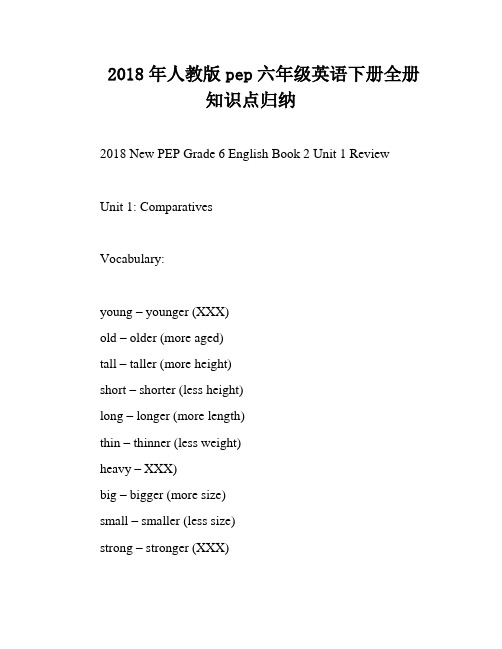
2018年人教版pep六年级英语下册全册知识点归纳2018 New PEP Grade 6 English Book 2 Unit 1 Review Unit 1: ComparativesVocabulary:young – younger (XXX)old – older (more aged)tall – taller (more height)short – shorter (less height)long – longer (more length)thin – thinner (less weight)heavy – XXX)big – bigger (more size)small – smaller (less size)strong – stronger (XXX)XXX:1.That is the XXX.2.You are older than me.3.How tall are you。
I am 1.65 meters.4.What size are your shoes。
I wear size 37.5.Your XXX.6.How heavy are you。
I weigh 48 kilograms.Grammar:Comparative Adjectives:parative adjectives are used to compare two things or people。
The comparative form is usually followed by "than" and the pronoun after "than" is in the subject form (or object form in spoken English).2.XXX:a。
Add "-er" to the end of most adjectives.b。
人教PEP六年级英语下册知识归纳

人教PEP六年级英语下单元知识归纳Unit 1 How tall are you?询问对方身高— How tall are you?你有多高?— I’m 1.64 meters. 我身高1.64米。
结构:How tall are/is you/he/she...?当询问是主语是you时,要用I’m...meter(s).回答当主语是第三人称单数时,要用He/She is...meter(s).回答询问对方穿多大码数鞋子— What size are your shoes, Mike?迈克,你穿多大号的鞋? — Size 7. 7号。
结构:What size be动词+your/...shoes?询问对方体重的句型— How heavy are you?你体重多少?— I’m 48 kilograms. 我体重48公斤。
结构:How + 形容词原级 + be动词(is/are) + 主语?举一反三:— How old are you?你多大?— I’m 14/15(years old). 我14/15(岁了)。
— How big are your feet?你的脚多大?— I wear size 17/16. 我穿17/16号的鞋。
拓展:How long is your pencil?你的铅笔多长?How long are your legs?你的腿多长?How tall is the building?那栋建筑物多高?How heavy are the apples?这些苹果有多重?A与B两个事物的比较级句型I’m thinner than you, and shorter.我比你瘦,比你矮。
结构:主语 + be动词(am/is/are) + 形容词比较级 + than + 宾语. 举一反三:I’m younger than my brother. 我比我哥哥年轻。
The yellow monkey is taller than the brown one.那只黄色的猴子比棕色的猴子高。
人教版六年级下英语PEP六下复习要点
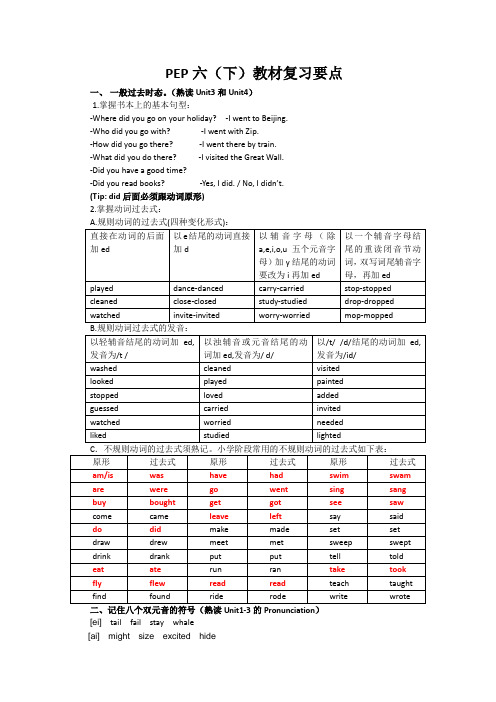
PEP六(下)教材复习要点一、一般过去时态。
(熟读Unit3和Unit4)1.掌握书本上的基本句型:-Where did you go on your holiday? -I went to Beijing.-Who did you go with? -I went with Zip.-How did you go there? -I went there by train.-What did you do there? -I visited the Great Wall.-Did you have a good time?-Did you read books? -Yes, I did. / No, I didn’t.(Tip: did后面必须跟动词原形)2.掌握动词过去式:二、记住八个双元音的符号(熟读Unit1-3的Pronunciation)[ei] tail fail stay whale[ai] might size excited hide[ɔi] soil toy moist boil[әu]throat goal row woke[au] count brown ground loudly[iә]hear cheers beer shear[εә]wear prepare share farewell[uә] sure poor三、比较级(熟读Unit1)1.句子结构1:A+ am/is/are+比较级+than +Beg. You’re taller than your brother.句子结构2:A+ am/is/are+量词+比较级+than +Beg. I’m 4 cm shorter than her aunt.(Tip: 两者进行比较时一定不能忘写:than)3.了解以下几个特殊的单词,它们的比较级是不规则的。
good-better bad-worse many/much-morelittle-less far-farther四、语法要点1.正确使用am,is ,are(这三个词都是“是”的意思,都是系动词be的变化形式)口诀:我用am, 你用are, is 连着他,她,它;单数名词用is,复数名词全用are。
2017-2018学年人教版pep英语六年级下册全册知识点归纳

2018新pep六年级英语下册知识点整理第一单元单词young—younger 更年轻的old -older 更年长的tall- taller 更咼的short-shorter 更矮的Ion g-l on ger 更长的thi n-thi nner 更瘦的heavy-heavier 更重的big-bigger 更大的small -smaller 更小的stro ng -stro nger 更强壮的二、句子1. That's the tallest dinosaur in this hall. 那是这个厅里最高的恐龙。
2. You're older than me. 你比我大。
3. How tall are you ?你有多高?rm 1.65 meters. 我身高1.65 米。
4. What size are your shoes? 你穿多大号的鞋。
5. My shoes are size37. 我穿37 号的鞋。
6. Your feet are bigger than mi ne. 你的脚比我的大。
7. How heavy are you? 你有多重?8. I'm 48 kilograms. 我体重48 公斤。
三、语法复习要点形容词的比较级1、形容词比较级在句子中的运用:两个事物或人的比较用比较级,比较级后面一般带有单词than。
than后的人称代词用主格(口语中可用宾格)。
2 •形容词加er的规则:⑴一般在词尾加er ;⑵以字母 e 结尾,力卩r ;nice---nicer⑶以一个元音字母和一个辅音字母结尾,应双写末尾的辅音字母,再加er ;big--- biggerthin-——thinner⑷以“辅音字母+y”结尾,先把y变i,再加er 。
heavy----heavier3. 不规则形容词比较级:good/well-better(2).Your feet are bigger than mine. 你的脚比我的大。
新人教PEP版六年级下册小学英语全册单元知识点小结

新人教PEP版六年级下册小学英语全册(单元知识点小结)Unit 1 How tall are you?一、核心词汇互为反义词的比较级:shorter更矮的/更短的— taller更高的/longer更长的older更年长的— younger更年轻的thinner更瘦的— stronger更强壮的/heavier更重的bigger 更大的— smaller 更小的拓展词汇——形容词比较级:1. 形容词比较级一般情况下直接在原级词尾加-er。
如:clean — cleaner;2. 以不发音的e结尾的单词直接加-r。
如: large — larger nice — nicer;3. 以“辅音字母 + y”结尾的单词变y为i,再加-er。
如:easy — easier busy — busier happy — happier funny — funnier;4. 以重读闭音节结尾的单词,要先双写词尾的辅音字母,再加-er。
如:red —redder fat — fatter sad — sadder;5. 不规则变化。
如:good — better bad — worse many — more little — less6. 多音节词和部分双音节词则在词前加more。
如:beautiful — more beautiful exciting — more exciting二、了解词汇dinosaur恐龙hall大厅metre米(美式英语: meter)than比both两个都 kilogram千克;公斤countryside乡村lower(low的比较级)更低地shadow阴影;影子smarter(smart的比较级)更聪明的become开始变得;变成三、核心句型1. — How tall are you?你有多高?— I’m 1.64 metres. 我身高1.64米。
2. — What size are your shoes, Mike?迈克,你穿多大号的鞋?— Size 7. 7号。
PEP人教小学英语六年级下册知识点归纳
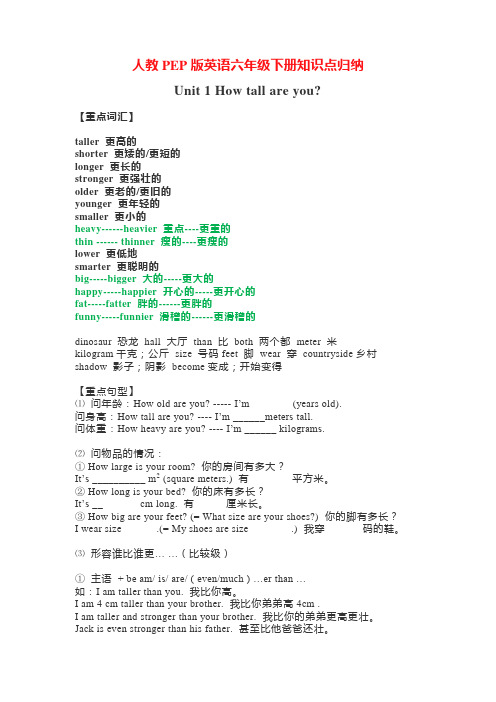
人教PEP版英语六年级下册知识点归纳Unit 1 How tall are you?【重点词汇】taller 更高的shorter 更矮的/更短的longer 更长的stronger 更强壮的older 更老的/更旧的younger 更年轻的smaller 更小的heavy------heavier 重点----更重的thin ------ thinner 瘦的----更瘦的lower 更低地smarter 更聪明的big-----bigger 大的-----更大的happy-----happier 开心的-----更开心的fat-----fatter 胖的------更胖的funny-----funnier 滑稽的------更滑稽的dinosaur 恐龙hall 大厅than 比both 两个都meter 米kilogram千克;公斤size 号码feet 脚wear 穿countryside乡村shadow 影子;阴影become变成;开始变得【重点句型】⑴问年龄:How old are you? ----- I’m _______ (years old).问身高:How tall are you? ---- I’m ______meters tall.问体重:How heavy are you? ---- I’m ______ kilograms.⑵问物品的情况:① How large is your room? 你的房间有多大?It’s __________ m2 (square meters.) 有_______ 平方米。
② How long is your bed? 你的床有多长?It’s _________cm long. 有______厘米长。
③ How big are your feet? (= What size are your shoes?) 你的脚有多长?I wear size ______.(= My shoes are size________.) 我穿_______码的鞋。
- 1、下载文档前请自行甄别文档内容的完整性,平台不提供额外的编辑、内容补充、找答案等附加服务。
- 2、"仅部分预览"的文档,不可在线预览部分如存在完整性等问题,可反馈申请退款(可完整预览的文档不适用该条件!)。
- 3、如文档侵犯您的权益,请联系客服反馈,我们会尽快为您处理(人工客服工作时间:9:00-18:30)。
2015新pep六年级英语下册知识点整理第一单元一、单词young— younger更年轻的 old -older更年长的 tall- taller更高的short-shorter更矮的 long-longer更长的 thin-thinner更瘦的heavy-heavier更重的 big-bigger更大的 small -smaller更小的strong -stronger更强壮的二、句子1.That's the tallest dinosaur in this hall. 那是这个厅里最高的恐龙。
2.You're older than me.你比我大。
3.How tall are you?你有多高? I'm 1.65 meters.我身高1.65米。
4.What size are your shoes?你穿多大号的鞋。
5.My shoes are size37.我穿37号的鞋。
6. Your feet are bigger than mine.你的脚比我的大。
7. How heavy are you?你有多重?8. I'm 48 kilograms.我体重48公斤。
三、语法复习要点形容词的比较级1、形容词比较级在句子中的运用:两个事物或人的比较用比较级,比较级后面一般带有单词than。
than后的人称代词用主格(口语中可用宾格)。
2.形容词加er的规则:⑴一般在词尾加er ;⑵以字母e 结尾,加r ;nice---nicer⑶以一个元音字母和一个辅音字母结尾,应双写末尾的辅音字母,再加er ;big--- bigger thin---- thinner⑷以“辅音字母+y”结尾,先把y变i,再加er 。
heavy----heavier3.不规则形容词比较级: good/well-better例句:(1).It's taller than both of us together.它比我俩加起来还高。
(2).Your feet are bigger than mine.你的脚比我的大。
(3).I’m heavier than you.我比你重。
第二单元一、单词clean打扫 -- cleaned(clean 的过去式)打扫stay停留 -- stayed (stay的过去式)停留wash洗—— washed 洗 watch看——watched看 have患病——had 患病sleep 睡觉——slept睡觉 read读——read 读 see 看见——saw看见last 上一个的 yesterday 昨天 before在…之前二、短语clean my room 打扫我的房间 wash my clothes 洗衣服 stay at home 呆在家里watch TV 看电视 go boating 划船 read a book 读书see a film 看电影 have a cold 感冒 sleep 睡觉(过去式slept)climb a mountain 爬山 cooked dinner做饭 cook noodles 面条三、句子1.How was your weekend?你周末过得怎么样?2.It was good/fine/ok,thank you.很好,谢谢!3.What did you do last weekend?你上个周末干了什么?4.I stayed at home with your grandma.我和你奶奶呆在家里.(with和谁)5. Did you do anything else?你还做了其他什么事吗?6. Yes,I cleaned my room and washed my clothes.是的,我扫了房间,还洗了衣服。
7.I want to buy the new film magazine.我想买期新的电影杂志。
8.Did you see a film?你看电影了吗?No,I didn’t .I had a cold. I stayed at home all weekend and slept.没有,我感冒了。
整个周末都呆在家里睡觉。
(肯定回答Yes,I did.)四、语法知识:一般过去时1.一般过去时表示过去某个时间发生的动作或存在的状态,常和表示过去的时间状语连用。
一般过去时也表示过去经常或反复发生的动作感谢。
2.Be动词在一般过去时中的变化:⑴am 和is在一般过去时中变为was。
(was not=wasn’t)⑵are在一般过去时中变为were。
(were not=weren’t)⑶带有was或were的句子,其否定、疑问的变化和is, am, are一样,即否定句在was或were后加not,一般疑问句把was或were调到句首。
3.句中没有be动词的一般过去时的句子(1) 否定句:didn’t +动词原形,如:Jim didn’t go home yesterday.(2)一般疑问句:在句首加did,句子中的动词过去式变回原形。
如:Did Jim go home yesterday?(3)特殊疑问句:疑问词+did+主语+动词原形?如:What did you do yesterday? I read a book.第三单元一、单词(用的过去式)go 去——went去 fish 钓鱼 ride骑-- rode 骑 hurt受伤-- hurt 受伤eat 吃--ate 吃 take—took buy买-- boughtgo camping 野营--went camping 野营 go fishing 去钓鱼--went fishing 去钓鱼take pictures照相-- took pictures 照相 buy gifts 买礼物-- bought gifts 买礼物二、短语ride a horse 骑马 -- rode a horse 骑马ride a bike骑自行车-- rode a bike 骑自行车hurt my foot——hurt my foot 我的脚受伤eat fresh food--ate fresh food 吃新鲜食物 far from 远离 look like 看起来像三、句子1.What happened?怎么了?2.Are you right?你还好吧?3.I'm OK now.我现在沒事了。
4.Where did you go yesterday?昨天你去哪儿了?I went to a park.我去公园了。
5.It looks like a mule.它看起来像头骡子。
6.Did you go to Turpan? Yes,we did.你们去吐鲁番了吗?是的,去了。
7.How did you go there?你们怎么去的?8.We went there by plane. 我们做飞机去。
9.Sounds great.听上去不错。
四、语法知识:动词过去式变化规则:1.一般在动词末尾加-ed,如:clean-cleaned, cook-cooked ,stay-stayed,2.结尾是e加d,如:live-lived,like-liked3.末尾只有一个元音字母和一个辅音字母的重读闭音节,应双写末尾的辅音字母,再加-ed,如:stop-stopped,4.以“辅音字母+y”结尾的,变y为i,再加-ed,如:study-studied cry-cried5.不规则动词过去式:read--read, hurt--hurt, am/is--was, are--were, do--did, see--saw, sleep--slept, buy--bought, get--got, go--went, have--had, eat--ate, take--took, run--ran, sing--sang, make--made, drink--drank, ride--rode,come--came, give--gave第四单元一、单词dining hall 饭厅grass草坪 gym 体育馆ago 以前cycling 骑自行车运动go cycling去骑自行车 ice-skate滑冰 badminton羽毛球运动二、短语…years ago (几)年前…months ago(几个)月前 last year 去年 last month上个月 play badminton 打羽毛球三、句子1.There was no library in my old school.我以前的学校里没有图书馆。
2.Tell us about your school, please.请给我们讲讲您的学校吧!3.How do you know that?你是怎么知道的?4.There was no computer or Internet in my time.我那时候没有电脑也没有网络。
5.Before,I was quiet. Now I am very active in class.我以前很安静。
现在我在课堂上很活跃。
6.I was short, so I couldn't ride my bike well.我以前个子小,自行车骑得不好。
7.Now I go cycling every day.现在我天天骑车。
四、作文: Last weekendI was busy last weekend. Saturday morning , I did my homework . Then, I visited my grandparents. In the afternoon, I went swimming with my friends. Sunday morning, my parents and I went to a park. We went boating and flew kites. It was a happy weekend.。
